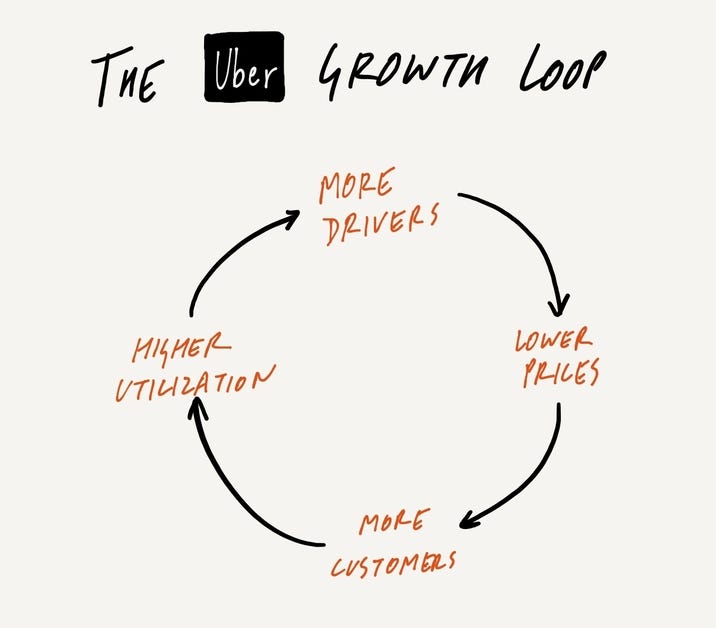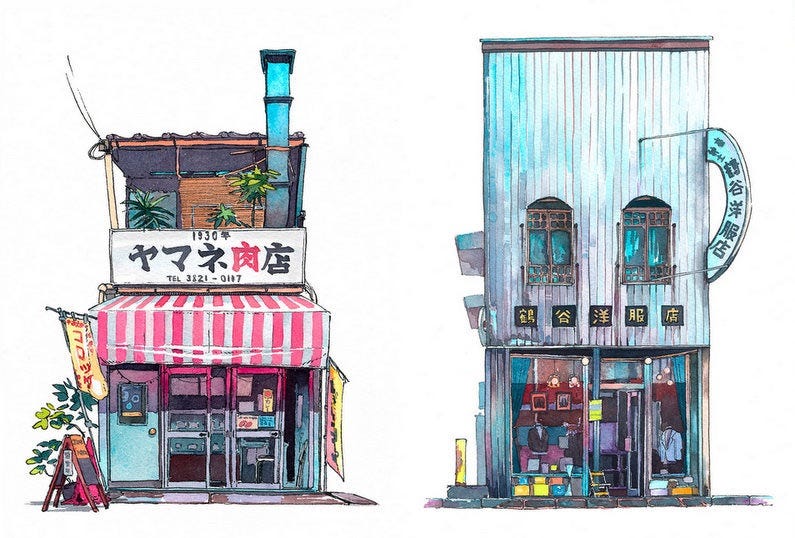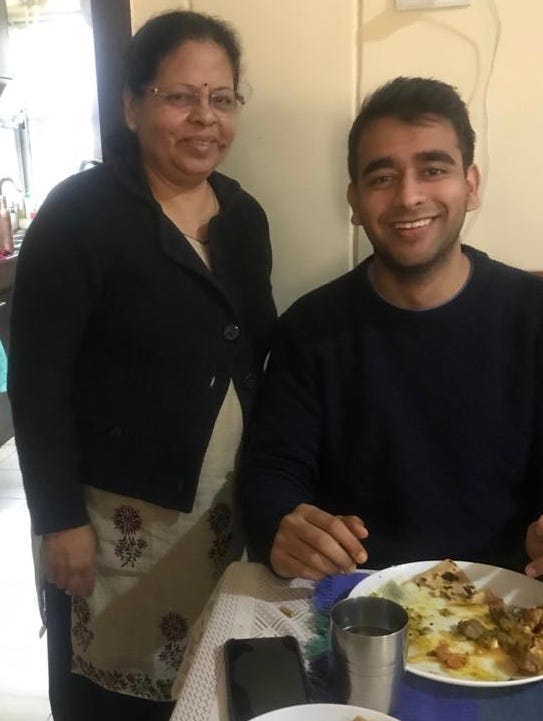Sunday Snapshots (22nd December, 2019)
Lyndon Johnson’s invalid assumptions, UberEats India, Tokyo storefronts, and the best chefs
Hey everyone,
Greeting from Ranchi, India!
I’m here visiting my uncles and grandparents. While no one can do what your parents do for you, one of the feelings I always have when I’m back home is to how large an extent I was raised by my extended family – uncles, older cousins, and family friends.
Travel always means more time to dig into something a bit more meatier. I definitely did that this week.
But before we get into that, I’d love to know how you’re thinking about goals and resolutions for the New Year. It’s going to be a special one for me – I’m going to graduate college, move cities, and start my first full-time job. Just reply to this email to send me your thoughts.
In this issue of Snapshots, I want to talk about:
Lyndon Johnson and invalid assumptions
UberEats leaving India
Tokyo storefronts
And more!
Book of the week

This week, I’m reading the last volume of The Years of LBJ series by Robert Caro, The Passage of Power. It covers LBJ’s unsuccessful run at the Democratic nomination for President in 1960, his decision to accept the Vice Presidency offered by Jack Kennedy, his humiliation as the Vice President, the fateful November morning in Dallas, and LBJ’s first few months into the Presidency.
Having not read Caro for almost a year, coming back to his work reminds me why he is my favorite author.
Sentences and paragraphs that have rhythm and build up to his point? Check. A gift for being able to place the reader in the physical space that he is writing about? Check. Decades of painstaking interviews that give you new insights into even much-discussed characters like JFK? Check.
Simply put, Robert Caro is the best biographer of our age.
And while Robert Caro is amazing, the man who he is writing about – “The Years” of whom he seeks to explain – is even more awe-inspiring. Lyndon Johnson at the start of the book has risen from not just from one of the poorest town in America, but from the poorest family in one of the poorest town in America. And while luck may have played a role in his rise, Lyndon Johnson has risen through the ranks of government not through luck. LBJ plotted the path to power, and he plotted the path all the way to the presidency.
That alone makes him worthy of study. Here were my takeaways from the first third of the book.
Losing the nomination:
LBJ was a favorite for the 1960 Democratic nomination. He was the Senate Majority Leader and since Eisenhower – who was then president – was a Republican, he was the highest ranking Democrat in the country. The nomination was his for the taking. Moreover, he wanted it. Wanted it more than any man has ever wanted anything.
So how did he lose to Jack Kennedy?
Two words: invalid assumptions.
He assumed that his position as the Senate Majority Leader gave him a heads up in the nomination. But the truth was that normal people didn’t really care – maybe didn’t even know – about how he had transformed an organization that the founding fathers designed as a dam against popular passions into the source of legislation in the country.
He assumed that his mastery of media – newspapers and radio – gave him a heads up in the nomination. But the truth was that there was now a new medium – television. And Jack Kennedy was a master of television. Aided in this understanding by his good looks and amplified across the airwaves by his father’s money, JFK made television a political tool like LBJ had once made newspapers a political tool.
He assumed that all the other nominees would battle it out amongst themselves and wear each other out, allowing him to sweep in at the end and secure the nomination. His plan was to get through the first round of nominations at the Democratic National Convention with a gridlock. If there was no consensus amongst the delegates, the conversations would move into the back rooms with the old bosses of the Democratic Party. Old bosses who not only liked Lyndon Johnson, but who didn’t like Jack Kennedy because of his inexperience and reputation as a rich man’s son. Lyndon Johnson, one of the greatest one-on-one salesman ever, would sell these old bosses on the product that he believed in the most – himself. But the truth was that he had underestimated Jack Kennedy. While he had no record of substance, Kennedy started planning for the run years in advance and laid the ground work for securing delegates. LBJ waited for others to cut each other down. He procrastinated. Hunter Thompson wrote, “A man who procrastinates in his choosing will inevitably have his choice made for him by circumstance.” LBJ had his choice made for him. The convention didn’t need a second round. Jack Kennedy won it in the first.
Vice Presidency:
Once LBJ lost the nomination, it was assumed that he would stay on as Majority Leader in the Senate. But the day after he beat Johnson, Jack Kennedy found himself in LBJ’s room asking him to be his Vice President. He needed Johnson on the ticket to secure the Southern votes for him.
The Vice Presidency is largely a ceremonial position. It was even more so back then. So why did LBJ accept JFK’s request?
Invalid assumptions – all expect one.
Lyndon Johnson always said that “power is where power goes.” All throughout his life, he took positions that were meaningless when he inherited them and transformed them – and in the process himself – into something powerful. He transformed Little Congress – a model Congress run by Congressional Aides – into a coveted organization that liasoned with the top Congressman in the real Congress. He transformed the position of the Senate Majority Leader from toothlessness (a previous Majority Leader had said that he’s “got nothing to scare them with and nothing to give them” in terms of his bargaining power with Senators) to the point where no legislation passed without Lyndon Johnson knowing exactly when, what, and how it should be passed. He thought he would do the same with the Vice President. He was wrong.
Lyndon Johnson also had a gift for being a professional son for old men. He had done this with FDR when he was just a junior Congressman. He had done it with George Russell of Georgia, the Southern Senator who controlled the Southern Caucus that in turn controlled the prized Committee assignments. But nowhere had he done this better than with Sam Rayburn, the Speaker of the House who controlled the flow of legislation there with an iron grip. Sam Rayburn didn’t do anything for anyone. But he did everything for Lyndon Johnson. So, when Johnson was deciding whether or not to take the Vice Presidential ticket, he told his aides, “I’ve still got Sam Rayburn in the House.” This would make him valuable to Kennedy even after he had secured the South for him – he wouldn’t be ignored like other Vice Presidents had been ignored. He had assumed that he would still have Sam Rayburn in the House. He was wrong.
Lyndon Johnson was also aware of the real purpose of the Vice Presidency. It was a backup plan. He always said, “And I’m just a heartbeat....” When Jack Kennedy’s aides brought up this possibility (his aides hated Johnson), Kennedy reminded them that he was just 43 years old and one of the healthiest presidential candidate in history – nothing could happen to him that would put Lyndon Johnson in the Oval Office. Here, Jack Kennedy was wrong.
As you can probably tell, I’m really enjoying reading Caro again. I’ll be digging more into The Passage of Power next week.
Business move of the week
Uber exits the food delivery business in India
My profitability thesis on Uber is that they’ll be able to increase driver utilization by leveraging both the ride-share and the EATS business (and maybe some other use cases), therefore attracting more drivers to the platform (increased utilization will typically mean higher earnings), will drives down prices for customers. This attracts more customers which in turn will increase driver utilization. It’s a classic network effect-based growth loop.

So what happens when they get out of the Eats business in a region? If we follow my hypothesis, they will see decreased driver utilization and lower driver earnings and so on and so forth. It doesn’t sound good. You have to balance that with mounting losses in one of the most cutthroat environments in the world. Swiggy and Zomato are its two biggest competitors in India and some of its most well-capitalized ones.
I suspect the decision was made somewhat recently. The key to the Indian market is pricing. With Uber now public company, it can’t withstand the pressure of mounting losses due to constant customer discounts, significant sign-up bonuses for drivers, and attractive take rates for restaurants. There is another feedback loop going on here. Every time you give a customer a discount, that becomes the new normal, so the original service seems expensive once the discount is gone. I suspect this is what happened with UberEats in India.
With 2021 set as the year that the company becomes profitable, Dara has said that they want to be “number 1 or number 2 in every market” they are in. They are number 3 in India.
An aside: I think there is a tremendous opportunity to unlock the 2nd and 3rd tier dining options in India. There are so many good places where the food is amazing, but there is little to no seating, maybe it doesn’t have the fanciest plates or the smoothest service. The visuals are not good. But the food is amazing. I suspect Uber and its competitors have unlocked some of this, but much of this is still unexplored. That’s the ultimate growth lever, at least in India.
As they head towards profitability, we’ll see more of these moves by Uber and a new company will emerge. A shell of its previous empire. An efficient, well functioning, still multi-billion dollar shell. Doesn’t sound too bad.
Random corner of the week

Occasionally, I’ll run into artwork that is so unique and interesting that I dig deep into the artist’s life. That happened this week with Mateusz Urbanowicz. His delicate, detailed yet simple paintings of Tokyo storefronts just make me happy.
Check out his work and consider getting one of his gorgeous books.
Meal of the week

It’s been a week of a lot of good food. Ultimately though, grandmothers are the best cooks. They wield recipes that are passed down from generation to generation in their expert hands honed through decades of cooking. You can feel the refinement of decades, even centuries, in every bite.
That wraps up this week’s Sunday Snapshots. If you want to discuss any of the ideas mentioned above or have any books/papers/links you think would be interesting to share on a future edition of Sunday Snapshots, please reach out to me by replying to this email or sending me a direct message on Twitter at @sidharthajha.
Until next Sunday,
Sid